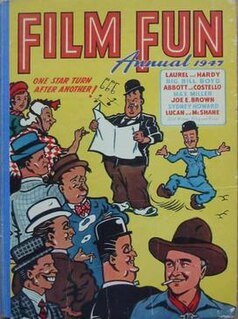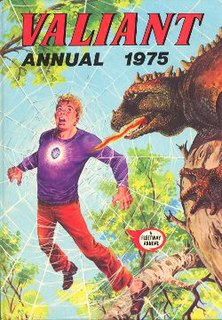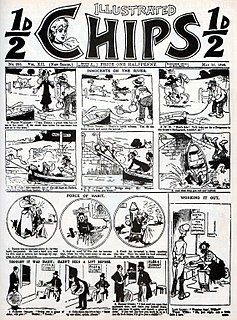The Beano is the longest running British children's comic magazine, published by DC Thomson in Dundee, Scotland. The comic first appeared on 30 July 1938, and was published weekly. In September 2009, The Beano's 3,500th issue was published. One of the best selling comics in the UK, along with The Dandy, the weekly circulation of The Beano in April 1950 was 1,974,072. The Beano is currently edited by John Anderson. Each issue is published on a Wednesday, with the issue date being that of the following Saturday. The Beano reached its 4,000th issue on 28 August 2019.

Rasher is a British comic strip published in the comics magazine The Beano, featuring Dennis the Menace's pet pig Rasher. Early episodes of the strip also featured Rasher's family, such his brother Hamlet, his sister Virginia Ham, Uncle Crackling and Little Piglet, who were all introduced in the first episode. It was initially drawn by David Sutherland and, in its first iteration, ran from 1984 until 1988.

Monster Fun was a weekly British comic strip magazine for children aged seven to twelve. Published by IPC Media, it ran for 73 issues in 1975–1976, when it merged with Buster. Focused on humorous monster strips and stories, the magazine was known for "The Bad Time Bedtime Books" minicomic inserts, created by Leo Baxendale.

Film Fun was a British celebrity comics comic book that ran from 17 January 1920 to 15 September 1962, when it merged with Buster, a total of 2225 issues. There were also annuals in the forties and fifties. It was renamed Film Fun and Thrills in 1959. As the title suggests, the comic mainly featured comic strip versions of people from films from the 1920s to the 1960s. Pre-war circulation at its peak was around 800,000 copies per week.

Knockout may refer to one of two British comics. The original series, published by the Amalgamated Press, started on 4th March 1939 and ended on 16th February 1963, when it merged with Valiant. The second series, published by IPC Magazines, ran from 12 June 1971 to 23 June 1973, when it merged with Whizzer and Chips.
Marvel UK was an imprint of Marvel Comics formed in 1972 to reprint US-produced stories for the British weekly comic market. Marvel UK later produced original material by British creators such as Alan Moore, John Wagner, Dave Gibbons, Steve Dillon, and Grant Morrison.

The Mighty World Of Marvel was a British comic book series published first by Marvel UK and then by Panini Comics. Initially debuting on 30 September 1972, it was the first title published by Marvel UK and ran until 1984. The series was revived in 2003 by Panini Comics, who are licensed to reprint Marvel US material in Europe, and was published monthly until November 2019.
Lew Stringer is a freelance comic artist and scriptwriter.
Lion was a weekly British comics periodical published by Fleetway from 23 February 1952 to 18 May 1974. It lasted for 1,156 issues.

Valiant was a British boys' adventure comics anthology which ran from 1962 to 1976. It was published by IPC Magazines and was one of that company's major adventure titles throughout the 1960s and early 1970s.
TV Century 21, later renamed TV21, TV21 and Tornado, TV21 and Joe 90, and TV21 again, was a weekly British children's comic published by City Magazines during the latter half of the 1960s. It promoted the many science-fiction television series created by the Century 21 Productions company of Gerry and Sylvia Anderson. The comic was published in the style of a newspaper of the future, with the front page usually dedicated to fictional news stories set in the worlds of Fireball XL5, Stingray, Thunderbirds, Captain Scarlet and the Mysterons and other stories. The front covers were also in colour, with photographs from one or more of the Anderson series or occasionally of the stars of the back-page feature.

Smash! was a weekly British comic book, published first by Odhams Press and subsequently by IPC Magazines, from 5 February 1966 to 3 April 1971. After 257 issues, it then merged into Valiant.

Power Comics was an imprint of the British comics publisher Odhams Press that was particularly notable for its use of material reprinted from American Marvel Comics. Appearing chiefly during the years 1967 and 1968, the Power Comics line consisted of five weekly titles: Wham!, Smash!, Pow!, Fantastic and Terrific. The first three of these titles were essentially traditional The Beano-style British comics papers, supplemented by a small amount of Marvel and DC Comics material, while Fantastic and Terrific were more magazine-like in style and were dominated by their Marvel superhero content.

Batman Legends was a monthly anthology comic book series published in the UK by Titan Magazines as part of their DC Comics 'Collector's' Edition' range. Initially published by Panini Comics for 41 issues between October 2003 and November 2006, Titan subsequently took over publication with the launch of the comic's second volume. The title reprinted Batman-related comics originally published by DC Comics in the United States, typically including three stories per issue in a serialised format.

Illustrated Chips was a British comic magazine published between 26 July 1890 and 12 September 1953. Its publisher was the Amalgamated Press, run by Alfred Harmsworth.

Spider-Man Comics Weekly was a Marvel UK publication which primarily published black-and-white reprints of American Marvel four-color Spider-Man stories. Marvel UK's second-ever title, Spider-Man Comics Weekly debuted in 1973, initially publishing "classic" 1960s Spider-Man stories.
Barrie Appleby is a British comics artist who works mainly for Scottish publisher D. C. Thomson & Co., drawing strips such as Dennis the Menace and Roger the Dodger for The Beano since the 1970s. He has also drawn Cuddles and Dimples for The Dandy, as well as strips for Nutty, Hoot, Monster Fun and Buster. He also drew Bananaman in the BEEB comic. In 1999, he took over Bananaman in the Dandy from John Geering. He returned for a short time to do Bananaman in 2008.
Funny Wonder was the name of a pre-War humourous comic published in the United Kingdom by Amalgamated Press. It was part of a long string of related titles which stretched from 1892 to 1953, known by a variety of additional titles, including Wonder, Jester, Jester and Wonder, Jolly Jester, Penny Wonder, and Halfpenny Wonder. There were two main (overlapping) runs, the first stretching from 1892 to 1940, and the second from 1912 to 1953; the first run being merged into the second. The most well-known, and longest-running single version, was Funny Wonder series 3, which ran 1,404 weekly issues from 1914 to 1942. Notable creators who worked on the comic include Reg Parlett and Roy Wilson.
Denis Gifford was a prolific comic artist and writer, most active in the 1940s, 50s and 60s. Gifford's work was largely for humour strips in British comics, often for L. Miller & Son. He was a highly influential comics historian, particularly of British comics from the 19th century to the 1940s.
City Magazines was a British publisher of weekly comics and magazines that operated in the 1960s. The bulk of the company's publications were comics magazines based on licensed television properties. The most notable titles published by City Magazines were TV Century 21 and Lady Penelope, both of which featured comics based on Gerry Anderson's Century 21 Productions Supermarionation shows.











